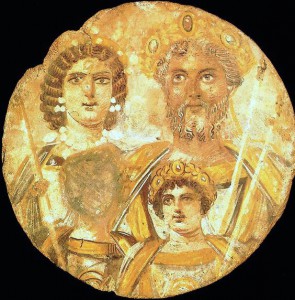(Latin: “condemnation of memory” ). A modern term for a sentence of official dishonor passed by the Roman Senate, which required that a person’s name be removed from public inscriptions and his portraits be destroyed. During the Roman Empire, damnatio memoriae was applied to unpopular emperors after their deaths. Web resource here.
 The Berlin Tondo: a portrait of the emperor Septimius Severus and his family. Tempera on wood. Ca. 199-201 CE. Antikensammlung, Berlin. The face of Geta (lower left) was erased in an act of damnatio memoriae.
The Berlin Tondo: a portrait of the emperor Septimius Severus and his family. Tempera on wood. Ca. 199-201 CE. Antikensammlung, Berlin. The face of Geta (lower left) was erased in an act of damnatio memoriae.